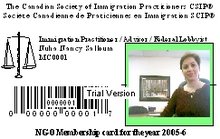Today's Alert
CSIC chair hid Benjamin Trister affidavit and CSIP chair is digging it out for future cross –examination against CSIC
The Law Society of Upper Canada (LSUC), now seeks to cross-examine Mr. Benjamin Trister, the former Chairperson of the
Respondent, the Canadian Societyof Immigration Consultants (CSIC), on his affidavit sworn March 3, 2005and filed in response
to LSUC's request for leave to commence an application for judicial review (Trister Affidavit) ,however the court granted CSIC the
withdrawal of Benjamin Trister affidavit, But Would CSIP chair brings Benjamin Trister as independent
witness against CSIC ? CSIP chair Nancy Salloum said: We will demand to cross- examination of Benjamin Trister in the
law suit of defamation against CSIC as independent witness ,no question ask, and I am sure his affidavit will contradict the
affidavit that was sworn December 9, 2005 (Brunet Affidavit). Mr. Brunet was Vice Chairperson of CSIC at the time Mr. Trister
served as Chairperson and served on the same Advisory Committee that recommended the current Regulations.
CSIP quotes from LSUC :"On October 28, 2005, Mr. Trister resigned as the Chairperson of CSIC, apparently after growing disillusioned and frustrated by CSIC's failure to efficiently regulate immigration consultants. Mr. Trister's misgivings are revealed in a public declaration he made on April 26, 2006 before the Ontario Legislative Assembly Standing Committee (OLASC) on Justice Policy regarding Bill 14, Access to Justice Act,2006, a bill which, among other things, proposes the regulation of paralegals by the LSUC. In the following extract, Mr. Trister is openly critical of the CSIC regulatory model:
The reason I decided to request to impose on your time is because I think the experience has been an important example of what you can expect if Bill 14 doesn't go through. If we don't get a consistent overriding regulator of legal services in Ontario, one alternative is to have many regulators. Some of the professions may be ready to regulate themselves. Others, like immigration consultants, are not. This doesn't give me pleasure to say because, of course, I was the person who was most in charge of regulating that profession, and for me to come to you and say I think it's been a failure and should be replaced by a different model
Perhaps doesn't speak well of my abilities as chair of the advisory committee or of the society. But I met with significant problems in dealing with the consulting community and their so-called leadership. The result of that, and I will give you specific examples, is that what has transpired has not been in the consumer's interest, nor has it been in the interests of the consultants who are regulated .unquote read
Friday, September 8, 2006
Subscribe to:
Comments (Atom)

